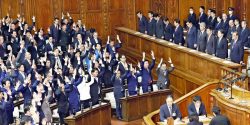12:30 JST, May 1, 2022
The novel coronavirus pandemic has made it even more difficult to maintain local railroad lines, which continue to operate at a loss. Local governments and railroad companies need to discuss ways to protect “community mobility.”
West Japan Railway Co. (JR West) has announced for the first time section-by-section balances of income and expenses for local lines with few passengers. A total of 30 sections on 17 lines with a daily average of fewer than 2,000 passengers per kilometer were covered in the announcement, and the annual deficit amounted to approximately ¥24.8 billion.
JR West said about half of the lines cost more than ¥1,000 to generate ¥100 in revenue, and some even cost more than ¥25,000. The situation is grave.
Hokkaido Railway Co. (JR Hokkaido), Shikoku Railway Co. and others, which receive financial support from the government, were already publishing section-by-section revenue and cost figures. Based on this information, JR Hokkaido is discussing with local governments the possibility of revising its service lines.
JR West and East Japan Railway Co. (JR East), which operate lines in major cities, have been using profits from conventional lines in urban areas and Shinkansen lines to make up for deficits on local railways.
However, people’s lifestyles have changed, including an increase in telecommuting. Revenues from urban area lines have dropped and the mechanism of covering local lines’ deficits with profits from urban services is collapsing. JR East is also considering the possibility of announcing the revenues and costs of its local lines.
Railroad companies need to strive for greater efficiency, but they are nearing the limits of their ability to rely solely on management efforts as the population of rural areas declines.
The Land, Infrastructure, Transport and Tourism Ministry has set up an expert panel to discuss the operation of railroad lines that have become unprofitable and will compile proposals as early as July.
A shift to bus services, which cost one-sixth to one-12th as much as train services, would be a viable option. Under the reform of the now defunct Japanese National Railways, the benchmark for converting to bus services was less than 4,000 passengers per kilometer. Today, this applies to more than half of all JR lines.
It is desirable to set a certain standard, scrutinize the impact on users and consider switching to buses.
There are examples of “ownership-operation separation,” in which the local government owns the stations, tracks and other facilities, and the railroad company is responsible for their operation, as well as cases in which local governments and private companies jointly invest in third-sector companies to maintain lines. However, many local governments are said to be reluctant to discuss such possibilities.
In some areas affected by the Great East Japan Earthquake, JR East has shifted to a new transportation system that allows buses to run on special tracks, thus achieving both lower costs and a certain level of convenience.
Instead of sticking to maintaining the train services, local governments, which are well versed in the specific conditions in their regions, should work with railroad companies to find a way out of the situation. The central government should also strengthen financial support for local governments and railroad companies that are reviewing their operations.
(From The Yomiuri Shimbun, May 1, 2022)
Top Articles in Editorial & Columns
-

40 Million Foreign Visitors to Japan: Urgent Measures Should Be Implemented to Tackle Overtourism
-

University of Tokyo Professor Arrested: Serious Lack of Ethical Sense, Failure of Institutional Governance
-

China Provoked Takaichi into Risky Move of Dissolving House of Representatives, But It’s a Gamble She Just Might Win
-

Policy Measures on Foreign Nationals: How Should Stricter Regulations and Coexistence Be Balanced?
-

PM Takaichi Should Help Young Japanese Break Seniority Barrier to Vitalize Politics
JN ACCESS RANKING
-

Japan Institute to Use Domestic Commercial Optical Lattice Clock to Set Japan Standard Time
-

Israeli Ambassador to Japan Speaks about Japan’s Role in the Reconstruction of Gaza
-

Man Infected with Measles May Have Come in Contact with Many People in Tokyo, Went to Store, Restaurant Around When Symptoms Emerged
-

Prudential Life Insurance Plans to Fully Compensate for Damages Caused by Fraudulent Actions Without Waiting for Third-Party Committee Review
-

Woman with Measles Visited Hospital in Tokyo Multiple Times Before Being Diagnosed with Disease




















